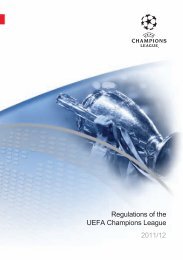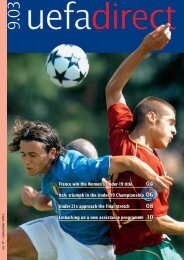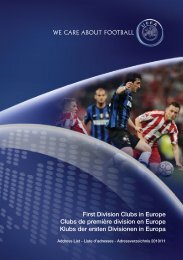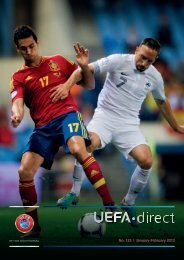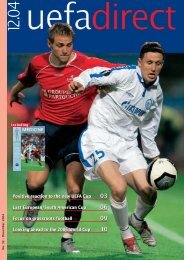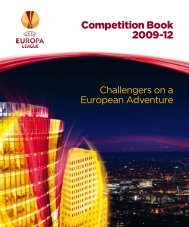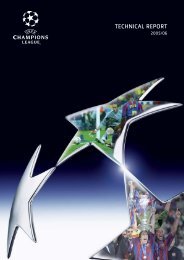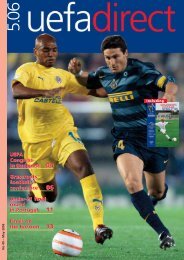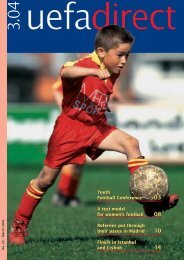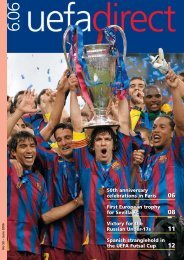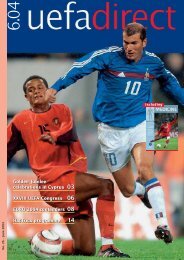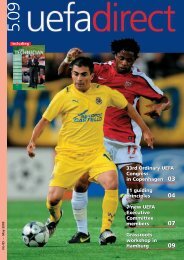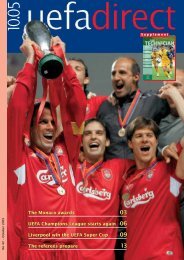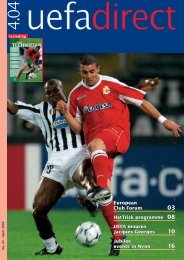UEFA gala in Monaco Fifty years of the champions' competition ...
UEFA gala in Monaco Fifty years of the champions' competition ...
UEFA gala in Monaco Fifty years of the champions' competition ...
Create successful ePaper yourself
Turn your PDF publications into a flip-book with our unique Google optimized e-Paper software.
Scenes from<br />
EURO 2004<br />
were analysed<br />
<strong>in</strong> plenary<br />
session.<br />
<strong>UEFA</strong><br />
<strong>UEFA</strong><br />
Sem<strong>in</strong>ars <strong>in</strong> Nyon<br />
Referees and assistant referees stay on <strong>the</strong> ball<br />
AT THE BEGINNING OF SEPTEMBER, <strong>UEFA</strong>’S ELITE AND TOP-CLASS REFEREES, AS WELL AS 37 ASSISTANT REFEREES,<br />
MET AT <strong>UEFA</strong>’S HEADQUARTERS IN NYON. THE MAIN TOPIC ON THE AGENDA WAS A REVIEW OF EURO 2004.<br />
The <strong>UEFA</strong> Referees Committee<br />
was very satisfied with <strong>the</strong> performances<br />
<strong>of</strong> <strong>the</strong> referees and assistant<br />
referees appo<strong>in</strong>ted for <strong>the</strong> European<br />
Championship f<strong>in</strong>al round <strong>in</strong> Portugal.<br />
However, this was no excuse for <strong>the</strong>m<br />
to rest on <strong>the</strong>ir laurels. Rema<strong>in</strong><strong>in</strong>g<br />
on <strong>the</strong> ball also meant ferret<strong>in</strong>g out <strong>the</strong><br />
smallest weaknesses. Under <strong>the</strong><br />
guidance <strong>of</strong> <strong>the</strong> members <strong>of</strong> <strong>the</strong> Committee,<br />
<strong>the</strong> match <strong>of</strong>ficials analysed<br />
Physical exertion<br />
under <strong>the</strong> spotlight<br />
Pr<strong>of</strong>. Werner Helsen, who has<br />
been entrusted by <strong>UEFA</strong> with <strong>the</strong><br />
physical fitness <strong>of</strong> its referees and<br />
assistant referees for some <strong>years</strong><br />
now, used <strong>the</strong> European Championship<br />
f<strong>in</strong>al<br />
round <strong>in</strong> Portugal<br />
to take a<br />
closer look at<br />
<strong>the</strong> physical<br />
exertion <strong>of</strong> <strong>the</strong><br />
match <strong>of</strong>ficials.<br />
“Dur<strong>in</strong>g a<br />
match, <strong>the</strong> referee<br />
and assistant<br />
referees<br />
are put under<br />
Werner<br />
Helsen<br />
<strong>UEFA</strong><br />
enormous pressure,<br />
marked<br />
by significant<br />
changes <strong>of</strong> direction and pace”,<br />
he summarised. His records show<br />
that a referee covers 12-15 km <strong>in</strong><br />
a match and changes direction or<br />
pace every four seconds. An assistant<br />
referee covers between six and<br />
eight kilometres and changes direction<br />
or pace as <strong>of</strong>ten as a player –<br />
about every six seconds on average.<br />
a selection <strong>of</strong> critical situations from<br />
EURO 2004, discussed problems and<br />
sought solutions.<br />
Trends on <strong>the</strong> field<br />
“It happens more and more<br />
that <strong>the</strong> referee is faced with <strong>the</strong><br />
question <strong>of</strong> whe<strong>the</strong>r a player was<br />
really brought down or whe<strong>the</strong>r he<br />
is try<strong>in</strong>g to w<strong>in</strong> a free kick or penalty<br />
that he does not deserve,” stated Ken<br />
Ridden, vice-chairman <strong>of</strong> <strong>the</strong> Referees<br />
Committee, <strong>in</strong>troduc<strong>in</strong>g <strong>the</strong> session<br />
on simulation. An exchange <strong>of</strong> views<br />
led on to <strong>the</strong> subjects <strong>of</strong> hold<strong>in</strong>g and<br />
push<strong>in</strong>g, and <strong>the</strong> illegal use <strong>of</strong> hands,<br />
arms and <strong>the</strong> body, as <strong>of</strong>ten seen on<br />
corner kicks. The discussion <strong>the</strong>n<br />
expanded to situations outside <strong>the</strong><br />
penalty area, when players use <strong>the</strong>ir<br />
bodies aga<strong>in</strong>st <strong>the</strong> rules, namely by<br />
committ<strong>in</strong>g bodychecks, which have<br />
become a new tactical trend. Excessive<br />
goal celebrations, particularly when<br />
players remove <strong>the</strong>ir shirts, were also<br />
illustrated with examples.<br />
Emphasis on cooperation<br />
A united team is <strong>the</strong> basis for<br />
good referee performances, or as<br />
former Portuguese referee Vitor Manuel<br />
Melo Pereira, now a member <strong>of</strong> <strong>the</strong><br />
<strong>UEFA</strong> Referees Committee, put it:<br />
“Three pairs <strong>of</strong> eyes are better than<br />
one.” He went on to underl<strong>in</strong>e <strong>the</strong><br />
importance <strong>of</strong> <strong>the</strong> team know<strong>in</strong>g each<br />
o<strong>the</strong>r well and regularly <strong>of</strong>ficiat<strong>in</strong>g<br />
toge<strong>the</strong>r. Before every match it was<br />
essential to make it clear who would<br />
assume what responsibility and what<br />
<strong>the</strong> priorities were. For example, <strong>the</strong><br />
assistant referees had to be clear<br />
about when <strong>the</strong> referee expected signs<br />
<strong>of</strong> agreement from <strong>the</strong>m. In <strong>of</strong>fside<br />
10 uefadirect 10.04



